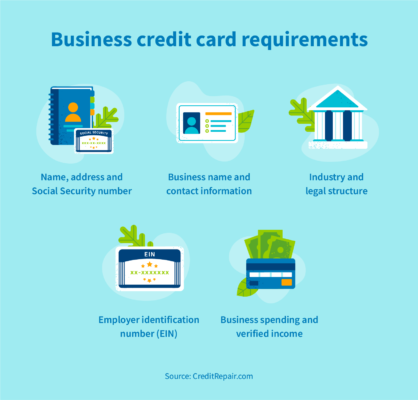
Disclosure regarding our editorial content standards.
Whether you have an established business or are just in the planning stages, you can benefit from understanding how to qualify for a business credit card. Getting a business card is an important part of separating your personal spending from business expenses. As your business grows, a business credit card enables you to build your company’s credit and empower your employees to make purchases on the company’s behalf.
Fortunately, qualifying for a business credit card is fairly straightforward, involving just a few steps and key decisions. At the end of this process is an important financial piece of your growing business: a business card tailored to business finances. Business cards also frequently have great perks and rewards, making them both practical and enjoyable.
Read on to determine whether a business credit card is right for you, what you’ll need to qualify and how to apply for a card.
Do you need a business credit card?
If you have a business—even a small business or one where you’re the only employee—you should probably get a business credit card. Regardless of your current approach to business finances, getting a business card has a few key advantages.
- You can start building your business credit. After opening a business card, your business will have its own credit file. Responsibly using credit will make it possible to access more money through loans as you grow your business.
- You can access capital now. Business loans are not always easy to procure, especially as a new business, so a credit card tailored to small businesses can often fill an important role in expanding early on.
- You can separate your personal money from business money. While many sole proprietors and small business owners use their personal bank accounts and credit cards to get their businesses off the ground, this is rarely advisable. Keeping your personal finances separate has many benefits, like making taxes easier to calculate and protecting your personal assets from being used to pay your business debts.
In short, anyone with a business should strongly consider getting a business credit card. These cards offer many advantages for business owners, including working capital for a business and distance between personal and business funds.
Fortunately, getting a card has relatively few requirements—most of which you’ve probably already covered in the process of getting your business off the ground.
Business credit card requirements
Before applying for a business credit card, you’ll want to make sure you meet the requirements. The following information is common for most business credit cards, so make sure you have it on hand before starting your application.

A bank or other financial institution offering a business credit card will likely ask for some or all of the following:
- Your name, address and Social Security number. Although your business will have its own credit file, your personal credit score is an important factor in whether you’ll be able to qualify for a business credit card.
- Your business name and contact information. Your business’s basic contact information—like name, address and phone number—will be required on an application. If you are self-employed and work from home, you may simply list your own name and address.
- Industry and legal structure. The application is likely to ask what industry your business operates in as well as what type of entity it is. For example, you may have an LLC, nonprofit or sole proprietorship.
- Employer identification number (EIN) or Federal Tax ID. Your business will have its own number assigned by the IRS, but if you don’t have an EIN, you can substitute your own Social Security number.
- Estimated spending and personal income. Finally, the card issuer will want to know about your income as well as how much you plan to spend for business expenses. Especially for new business owners, a bank or other financial institution will want to make sure you’ll be able to manage your personal finances and business finances with your current capital.
If you have all of that information prepared, you’re ready to apply for a business credit card.
How to apply for a business credit card in 4 steps
The process of applying for a business credit card takes just a few steps—checking your credit score, finding a suitable card, filling out an application and getting approved. Read on to learn how easy it is to get a card for your business.

Keep these four easy steps in mind as you work toward your business’s first credit card.
Step 1: Check your credit score
Before searching for the right card, you’ll want to know your personal credit score. Even though your business will have its own credit file, getting a business credit card depends significantly on your own credit history. You can often get a free credit score through your bank or current credit card issuer.
If you suspect or know that your credit score is not high enough to qualify for a business credit card, you may want to consider reviewing your credit report with the help of a credit repair company, which can help you dispute inaccurate items and make a plan to improve your score.
Step 2: Find the right credit card for your business
If you have a high enough score to qualify for a card, you’ll want to start considering which business credit card best suits your needs. Take the following factors into account:
- APR and annual fees. The interest rates and annual fees vary between cards. You may be able to find a card with a promotional APR that enables you to borrow money without interest for a period of time, but you’ll want to make sure you can pay off your balance before the true interest rate takes effect.
- Foreign transaction fees. If your business operates in several countries or currencies, a card that waives foreign transaction fees could be useful.
- Rewards and bonuses. Many cards have ongoing perks as well as introductory bonuses that could make them appealing depending on your business’s particular spending patterns.
If your credit score doesn’t enable you to qualify for a traditional business credit card, there are secured business credit cards that can help you further establish your business’s credit before reapplying. These cards work similarly to other secured credit cards, which require a deposit equal to the card’s credit limit.
Step 3: Fill out the application
Most credit card applications are now online, though you may also fill out a paper application at a bank branch—especially if you’re getting a business credit card through the same bank that your business already uses for other financial services.
When filling out the application, make sure you’re both careful and truthful. Any errors in your tax information could leave your application incomplete. Additionally, mischaracterizing your business’s revenue or spending could lead to serious problems down the road, so you’ll want to report your financial information accurately while applying.
Step 4: Wait for approval (or ask for reconsideration)
The final step to getting your business credit card is to wait for your application to be reviewed—which can take anywhere from a few moments to a few weeks, in most cases. If your application is denied for any reason, it’s best to ask the card issuer why, as this can help you make adjustments before your next application. Furthermore, some financial institutions have reconsideration lines, which you can call to offer additional information that may lead to approval.
If your application is approved, you’re ready to activate and start using your card for business expenses.
Will a business credit card affect your personal credit?
In many cases, your business credit card will affect your personal credit score—though if you use your card responsibly, the net effect is usually positive.
Your business card can affect your personal credit in a few ways:
- Your business credit card application may lead to a hard inquiry on your credit report. Since your personal credit history is used to apply for a business card, you may see a temporary drop in your score from the credit pull.
- Your business credit activity may show up on your personal credit report. Depending on the structure of your business and your arrangement with the card issuer, you may see credit activity—both positive and negative—from your business on your own credit report.
- Your card issuer may require a “personal guarantee.” Most business credit cards require you to sign a personal guarantee that holds you liable if your business is unable to pay its debts. Any negative items resulting from these debts could have an effect on your personal credit.
A business credit card is an excellent financial move for most businesses, and the application process is very straightforward. That said, many people are unaware that their personal credit is an important factor in getting a business card—and that their business card could affect their credit in turn.
To make sure you have a grasp on your credit before applying for a business credit card, reach out to the team at CreditRepair.com for help with reviewing your report and filing disputes with the credit bureaus.
Note: The information provided on CreditRepair.com does not, and is not intended to, act as legal, financial or credit advice; instead, it is for general informational purposes only.
Questions about credit repair?
Chat with an expert: 1-800-255-0263






